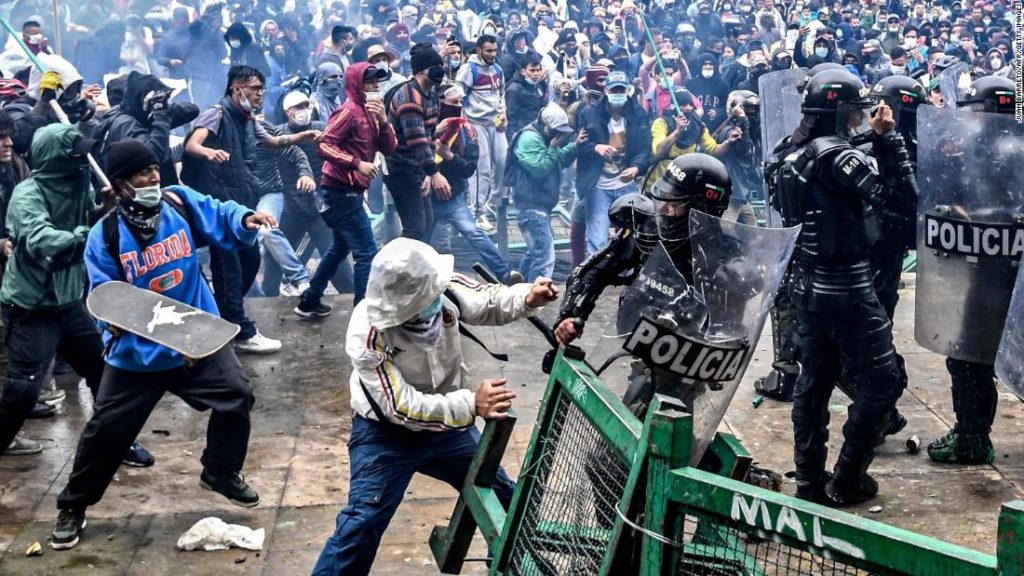Thousands of people are still taking to the streets to protest against police brutality and the economic cost of the pandemic amid Colombia’s extreme inequality. And with both issues common across South America — and exacerbated by the pandemic — many international observers are watching Colombia’s cycle of protest closely for signs of deeper regional effects.
Duque was the first president in the region to launch a tax overhaul to help his country’s pandemic-ravaged economy get back in shape. But rigid opposition from Colombia’s workers’ unions and social movements is a cautionary tale for any other president who plans to follow a similar route.
Such countries need to increase revenues through taxes in order to be able to spend — and even to maintain vital social programs like cash support for the unemployed and credit lines to businesses struggling with the pandemic.
Before he withdrew his tax reform plan, Duque stressed it was of pivotal importance for the state to increase its fiscal revenues. “The reform is not a whim, it’s a necessity to keep the social programs going,” he said.
But critics argued the tax hikes — like a proposed VAT increase on everyday goods — would disproportionally impact middle and working classes and escalate inequality even more.
But the now-withdrawn tax hike will leave a big hole in the state finances, and Duque’s government will have to look for alternatives to try and pass reforms to repair the very inequality that currently fuels much discontent.
Human rights concerns
Colombia’s ongoing protests have also prompted fear and outrage at law enforcement’s handling of demonstrators — a concern echoed by rights organizations and foreign observers.
“We’re here because it may seem a paradox, but in the middle of a pandemic our government is literally attacking our lives,” Joana Ivanazca Salgado, a 43-year-old artist who took part in Bogota’s protests last week, told CNN.
In the early hours of Wednesday, Bogota’s mayor, Claudia Lopez, made a tearful plea to all sides to abandon violence: “I beg Bogota and Colombia to stop. It’s been eight days of frankly, by miracle, that we don’t have a death [in Bogota] so far,” said Lopez.
At least 30 civilians and 16 policemen were injured late Tuesday, she said, in an ugly escalation of violence on both sides. According to Lopez, rioters set fire to one police station, where 15 policemen managed to escape.
Major General Oscar Antonio Gomez Heredia, the chief of police in Bogota, said during the same briefing that a total of 25 police stations had been attacked.
The political fallout
By late Tuesday, Duque called for a “national dialogue initiative” and while he said police forces are guaranteeing the right to protest, he pledged a thorough investigation into any possible abuse.
Looming over all these political calculations for the Colombian government are next year’s presidential elections: While Duque himself is barred from running, the conservative coalition that brought him the presidency is keen to project strength and control, capable of dealing with both the pandemic and the wave of protests. After withdrawing the fiscal reform plan, further concessions to demonstrators could weaken that image.
But Ivan Briscoe, Colombia analyst at the International Crisis Group, believes it would be misguided not to learn from protesters’ outrage. “The government must look beyond other parties and other political forces with which it has been negotiating its tax reform and take into account the demands of the Colombians in the streets,” said Briscoe.
You may also like
-
Afghanistan: Civilian casualties hit record high amid US withdrawal, UN says
-
How Taiwan is trying to defend against a cyber ‘World War III’
-
Pandemic travel news this week: Quarantine escapes and airplane disguises
-
Why would anyone trust Brexit Britain again?
-
Black fungus: A second crisis is killing survivors of India’s worst Covid wave

